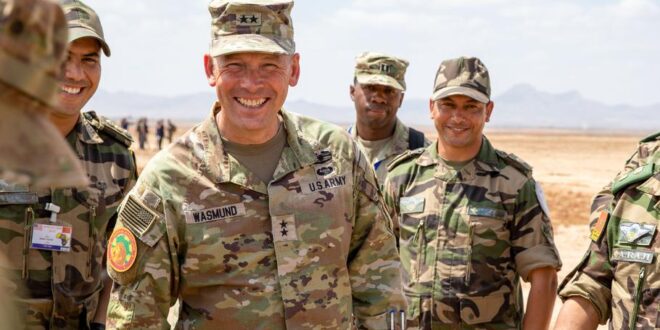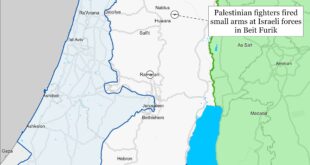Army Maj. Gen. Todd Wasmund’s first Africa-focused assignment came a decade ago at the Pentagon, where the aftermath of the Benghazi terrorist attack loomed over a military mission in flux.
The 2012 assault on the U.S. diplomatic compound in Libya began on the anniversary of the Sept. 11, 2001, attacks by al-Qaida and ended in the deaths of four people, including the U.S. ambassador to Libya and two former Navy SEALs.
Today, Wasmund commands day-to-day Army operations in Africa, where terrorist groups are expanding, democratic governments are under growing pressure and unpredictability still defines the security landscape, he said. “I think what’s the same is the persistent threat of instability that requires us to support our partners,” Wasmund, head of the Vicenza-based Southern European Task Force, Africa, said in an interview Wednesday.
His comments came just hours before a reported coup in Niger threatened to upend the entire U.S. approach to counterterrorism in a region where a string of military power grabs is challenging U.S. forces’ ability to coordinate on the ground.
“We continue to be challenged to have adequate access,” Wasmund said. “We’ve seen a collapse in Mali. We’ve seen a collapse in Burkina Faso … Where those transitions happen that are not reflective of our (democratic) values, we are really limited in our ability to partner with them.”
For the U.S., the events in Niger could have major implications, given the outsized role the country plays in the U.S. strategy for countering Islamic militants in the West African Sahel region.
In the central Nigerien town of Agadez, a $100 million U.S. drone site known as Base 201 is home to hundreds of U.S. troops. In all, there are about 1,100 U.S. servicemembers based in the country.
Those soldiers have been restricted to the Agadez base amid efforts from abroad to restore the democratically elected government, CNN reported Monday, citing a U.S. military official.
Special and regular Army troops routinely carry out training in other locations in Niger. The U.S. could be forced to abandon its drone site and sever ties with Niger’s military, as U.S. law puts restrictions on such cooperation after mutinies.
However, the White House has yet to decide whether the ouster of Niger’s president, Mohamed Bazoum, constitutes a coup.
“We continue to assess the situation as it evolves,” U.S. Africa Command spokesman John Manley said in a statement. “It is too early to speculate about future actions.”
The tumult in Niger underscores the challenges for the U.S. military in parts of Africa, where fragile governments and economies coupled with militaries stretched thin by terrorism fights add to the complexity.
Against a backdrop of coups and instability spanning the Sahel, the question becomes whether the U.S. military’s approach to security on the continent is making any difference.
Wasmund said he doesn’t see much growth for his Army mission in the years to come, considering global security demands in Europe and the Pacific. SETAF will continue to be “relatively resource-limited,” he said.
But to pull back would bring potential global risks, given Africa’s rapid population growth and expectations of economic expansion, he said.
“Africa is a long game, and we’ve got to be willing to play the long game,” Wasmund said. “We can’t have a short-term focus, can’t get distracted. We have to stay engaged with our partners.
“The potential is too great. The risk is too high, and we need to be there.”
The coups in West Africa are complicating U.S. military efforts at a time when Washington is vying with China and Russia for influence on the continent.
“If there was more flexibility (in U.S. regulations), we could potentially have greater influence … but I don’t think it is in the U.S.’ interest (to relax those regulations),” Wasmund said.
Niger brings into focus the kinds of dilemmas the United States faces in Africa, where mutineers in Mali and Burkina Faso had a long history of working and training with the American military.
Ceasing military cooperation with such countries could leave them less equipped to counter violent extremist groups.
In some cases, the vacuum left by the departure of U.S. and other Western partners created opportunities for organizations such as the Kremlin-linked Wagner Group, which has been expanding its reach in Africa, Wasmund said.
While Wagner sells itself as a security provider that doesn’t require democratic governance, it does have demands, namely access to natural resources or other forms of compensation, Wasmund said.
“We often see that those (African) leaders, after having made those agreements in the short run, tend to regret them in the long run,” he said.
But once Wagner is in, it’s hard to get them out, Wasmund added.
The SETAF mission in Africa involves getting the most out of relatively limited resources. For example, SETAF’s intelligence brigade is about one-third the size of its counterparts at U.S. European Command and Indo-Pacific Command, Army officials said.
Wasmund said the Army’s partners in the Sahel are under increasing strain from a mix of Islamic extremist groups, which have been gaining ground.
Even Ghana, long regarded as one of the more stable democracies, is feeling the heat on its northern border with Burkina Faso.
“We are a great partner, but the countries that we work with, the things that they want from us, often times military equipment capabilities, they want it faster than we can deliver,” Wasmund said. “They need to have capabilities, modern systems, in order to have an effective deterrence and to be able to defeat the threat.”
 Eurasia Press & News
Eurasia Press & News



